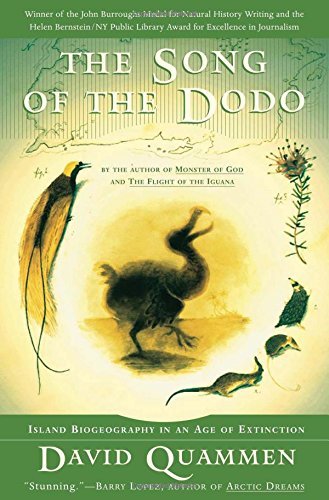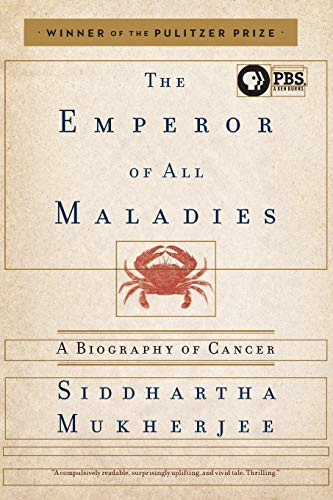(Part 3) Top products from r/labrats
We found 21 product mentions on r/labrats. We ranked the 119 resulting products by number of redditors who mentioned them. Here are the products ranked 41-60. You can also go back to the previous section.
41. Handbook of Biological Confocal Microscopy
Sentiment score: 1
Number of reviews: 1
 Show Reddit reviews
Show Reddit reviews42. Patch Clamping: An Introductory Guide to Patch Clamp Electrophysiology
Sentiment score: 0
Number of reviews: 1
 Show Reddit reviews
Show Reddit reviews43. Principles and Techniques of Biochemistry and Molecular Biology
Sentiment score: 1
Number of reviews: 1
Cambridge University Press
 Show Reddit reviews
Show Reddit reviews44. The Song of the Dodo: Island Biogeography in an Age of Extinction
Sentiment score: 1
Number of reviews: 1
Scribner
 Show Reddit reviews
Show Reddit reviews45. Bad Science: Quacks, Hacks, and Big Pharma Flacks
Sentiment score: 0
Number of reviews: 1
 Show Reddit reviews
Show Reddit reviews46. Molecular Biology of the Cell (Sixth Edition)
Sentiment score: 1
Number of reviews: 1
Garland Publishing
 Show Reddit reviews
Show Reddit reviews47. Writing the Laboratory Notebook (An American Chemical Society Publication)
Sentiment score: 1
Number of reviews: 1
Used Book in Good Condition
 Show Reddit reviews
Show Reddit reviews48. Lab Math: A Handbook of Measurements, Calculations, and Other Quantitative Skills for Use at the Bench, Second edition
Sentiment score: 0
Number of reviews: 1
 Show Reddit reviews
Show Reddit reviews49. Phylogenetic Trees Made Easy: A How-To Manual
Sentiment score: 1
Number of reviews: 1
 Show Reddit reviews
Show Reddit reviews50. The Eighth Day of Creation: Makers of the Revolution in Biology, Commemorative Edition
Sentiment score: 0
Number of reviews: 1
 Show Reddit reviews
Show Reddit reviews51. Fly Pushing: The Theory and Practice of Drosophila Genetics
Sentiment score: 0
Number of reviews: 1
 Show Reddit reviews
Show Reddit reviews52. Career Opportunities in Biotechnology and Drug Development
Sentiment score: 1
Number of reviews: 1
Cold Spring Harbor Laboratory Press
 Show Reddit reviews
Show Reddit reviews53. The Analysis of Biological Data
Sentiment score: 1
Number of reviews: 1
Hardcover, Statistics textbook, Biostats, Biology Stats, Biology Statistics
 Show Reddit reviews
Show Reddit reviews54. National Geographic Little Kids First Big Book of How (National Geographic Little Kids First Big Books)
Sentiment score: 1
Number of reviews: 1
National Geographic Society
 Show Reddit reviews
Show Reddit reviews55. The Emperor of All Maladies: A Biography of Cancer
Sentiment score: -1
Number of reviews: 1
The Emperor of All Maladies A Biography of Cancer
 Show Reddit reviews
Show Reddit reviews56. Science Ink: Tattoos of the Science Obsessed
Sentiment score: 1
Number of reviews: 1
Sterling
 Show Reddit reviews
Show Reddit reviews57. Baby University Board Book Set: Four Science Board Books for Babies (Baby University Board Book Sets)
Sentiment score: 0
Number of reviews: 1
 Show Reddit reviews
Show Reddit reviews


I don't think this is exactly what you're looking for, but At The Bench - A Laboratory Navigator has a 10-page chapter about keeping a lab notebook.
Here's a brief Google Books preview; unfortunately it does not cover the relevant chapter.
This presentation(PDF link) cites a book called Writing the Laboratory Notebook by Howard Kanare, which (based on the Amazon reviews) might be more geared towards industry labs but could still be pretty useful in a general sense. You can find out for yourself, since I managed to find a full text copy online(PDF link). I don't think I'm accessing this through any proxies, so it does seem like it's freely available.
For a more thorough investigation of what's out there, you should consult your institution's library; I'm sure someone will be happy to help track down the exact book you are thinking of, or something functionally equivalent.
edit - here's a PDF link to another presentation, just for fun
I have experience with MEGA to generate trees. I agree that it's a clunky software, but once you understand how to use it, it's not so bad.
I recommend the following book if you want to become a MEGA power-user: https://www.amazon.com/Phylogenetic-Trees-Made-Easy-Manual/dp/0878936068
Before you start... you say you are looking at the protein sequences. Are you starting with the amino acid sequence or the mRNA sequence? If mRNA, make sure all sequences are in the same orientation (ATG/start on the 5' end of the sequence). I find that if you have just one or two sequences that have been copied in the reverse direction, the alignment may not work. You can also save multiple alignments -- try some with seemingly more conserved sequences (less gaps) and try the entire set.
Once you have all your sequences in one FASTA file or multiple FASTA files, import them into MEGA. From the 'Align' menu, choose to edit/build an alignment. Add your sequences. Select all sequences for alignment and then align selected (you can get into some advanced settings here, change the alignment algorithm, etc.) Save the alignment as a .mas file and export as a .meg file.
Now, open your .meg file in MEGA's main window. From the phylogeny menu, select to build a neighbor joining tree. Based on the alignment, the program will auto-build a tree for you. Again, lots of functionality exists in the program, but it's not an intuitive UI.
Happy to help if you have other questions!
Might I recommend the late Jim Pawley's excellent and comprehensive Handbook of Biological Confocal Microscopy?
Handbook of Biological Confocal Microscopy https://www.amazon.com/dp/038725921X/ref=cm_sw_r_cp_apa_i_odTYCbAS6N4TN
The Nikon microscopy U sites are good basic primers. I would also recommend getting to know the staff at your friendly local core facility who can help guide you on specific questions.
I got my niece a Marie Curie doll that she absolutely loves. I know you asked for boy toys, but I figured it someone else is reading this, it might be helpful.
My nephew loved the Nat Geo Little Kids First Book of.... They have a whole bunch in the series.
Once their older I think we are going to start getting them the mechanical toy kits to make stuff themselves. I totally don't understand kids toys today though.
the song of the dodo by david quammen. one of my favorite science books. i wish there was an audiobook available, i’d love to experience it again on my commute to work.
The analysis of biological data is fantastic for foundation stuff. Really recommend it.
https://www.amazon.com/Analysis-Biological-Data-Michael-Whitlock/dp/0981519407
http://kirschner.med.harvard.edu/files/protocols/Novagen_petsystem.pdf
pet plasmids manual from novagen. Some protein work scattered about, a lot of cloning. Mostly just generic stuff but can bring up ideas to consider.
https://www.sigmaaldrich.com/content/dam/sigma-aldrich/docs/Sigma-Aldrich/General_Information/1/ge-strategies-for-protein-purification.pdf No protocols but general information on purifications in general.
https://www.amazon.com/Principles-Techniques-Biochemistry-Molecular-Biology/dp/0521731674 Same. Some useful tips and explains care of equipment and uses.
I decided to leave academia about 3-4 years ago, and found this book very useful. It outlines several dozen potential careers, complete with the good and bad about them, how to break into them, companies to look at, websites to visit, specific job boards, etc.
It's a little dated (2009), but it can give you a good idea of what's out there. I'd offer you my copy, but I already gave it away.
I know people that have gone into consulting, patent law, technical writing, QA/QC, management, analysis, etc. "Analysis" is a field scientists tend to do well in; It's about recognizing all the details and unforeseen causes & results that people tend to miss
https://www.amazon.com/gp/aw/d/0815344325/ref=dp_ob_neva_mobile
Best book ever on the subject.
Check out Science Ink for inspiration.
https://www.amazon.com/Science-Ink-Tattoos-Obsessed/dp/1454912405
Chemistry: a novel was an emotional read for me. I recently made the decision to put off pursuing a phd, and could relate so hard to the author. It was also a very poetic read, and very fast. Highly recommended.
On that note, my boss bought a set of these books for the lab. It's an enjoyable read and helped me write a recent research proposal.
I highly recommend you these books: labmaths and at the bench
Bad Science by Ben Goldacre is the only science book I've convinced my non-scientist family to read. It drastically cut down on the number of phone calls I get about whether or not some Facebook-promoted scam is going to cure whatever ails them.
UBC's online neuroanatomy course/resources are phenomenal: http://www.neuroanatomy.ca
I'd also recommend (also by Dr. Krebs who did the online course) Lippincott's for neuroscience: https://www.amazon.com/Lippincott-Illustrated-Reviews-Neuroscience/dp/1605473170
Your bible https://www.amazon.com/Fly-Pushing-Practice-Drosophila-Genetics/dp/0879697113
Physics for babies: https://www.amazon.com/Baby-University-Four-Book-Chris-Ferrie/dp/149267043X/
If you haven't read Eighth Day of Creation yet, do it.
https://www.amazon.com/Channels-Excitable-Membranes-Bertil-Hille/dp/0878933212
https://www.amazon.com/Patch-Clamping-Introductory-Guide-Electrophysiology/dp/047148685X/ref=sr_1_1?s=books&ie=UTF8&qid=1518292111&sr=1-1&keywords=patch+clamp+physiology
following up here, but take a look at The Emperor of All Maladies for a little history into how cancer became a huge marketing, PR, and money-raising machine in the mid 20th century, led largely by Mary Lasker.
This coincided with radical changes in breast cancer surgery from the mid to late 20th centuries. Breast cancer surgery used to be a mutilating procedure that would remove the entire breast and inner chest cavity, despite barely any differences in real outcomes. It was easy to champion breast cancer research partly for these reasons and partly because it was one of the first cancers in which we understood the biology of certain types (namely, BRCA genes as well as HER2-positive cancers that could be treated with tamoxifen). This gave the public added confidence in their money going to research which was leading to tangible improvements in cancer outcomes.